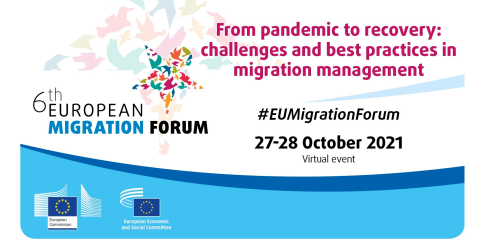European Economic
and Social Committee
European Migration Forum: It is high time for humane migration management that leaves nobody behind
The two-day European Migration Forum (EMF), held virtually by the European Economic and Social Committee (EESC) and the European Commission, stressed the indispensable role of migrants during the pandemic and the great potential of their contribution to the EU's economic and social recovery after the COVID-19 crisis.
The sixth European Migration Forum (EMF), a platform for dialogue on migration, opened on 27 October after a year-long break caused by COVID-19 to take a closer look at migration management during the COVID-19 crisis and its aftermath.
Entitled From pandemic to recovery: challenges and best practices in migration management, the EMF – this year held under the umbrella of the Conference on the Future of Europe – shone a special spotlight on some of the issues that have come to the fore as the preconditions for successful migrant integration after the COVID-19 crisis.
These issues are migrant children's access to education, migrants' digital inclusion, legal pathways with a special emphasis on community sponsorship and migrants' contribution to the recovery.
The situation of many migrants deteriorated during the pandemic. The EMF heard that, although many of them played a crucial role, accounting for 30% of essential workers who made sure that life did not stop during lockdowns, they were among the hardest hit, as they had a higher chance of losing their job, were two to four times more likely to die from COVID-19 and had restricted access to online education.
The event's keynote speakers, EESC president Christa Schweng and Commissioner for Home Affairs Ylva Johansson, highlighted the importance of inclusive employment and education and the role of local communities and social partners for successful integration of migrants.
Both speakers advocated reinforcing a more positive narrative on migration as the current narrative is almost entirely focused on border management and irregular entries. They strongly condemned recent human rights violations at the EU's external borders.
Ms Schweng said the EESC deplored the lack of solidarity and ambition by some Member States in the area of migration.
We are not seeing a real shift from a position based on protecting EU borders and combating irregular migration towards a real balance between solidarity and responsibility. It's time to put in place a realistic, humane and sustainable migration management strategy that leaves no one behind and recognises migrants' contribution to the recovery,
the EESC president stressed.
Using migrants and refugees as a political tool is unacceptable, as this violates fundamental European values and international law. The EESC opposes any attempt to legalise pushbacks,
Ms Schweng said, referring to recent violent events at the Polish-Belarus border.
Europe is facing complex, unexpected challenges, the starkest of which right now is the state-sponsored migrant smuggling of human beings by Belarus,
Ms Johanssen said.
To counter this, the European Commission launched a new action plan against migrant smuggling, which goes hand in hand with the fight against illegal employment, one of the key drivers of irregular migration.
Ms Johansson stressed the critical roles of NGOs, social partners and local authorities, and of migrants and their organisations in the post-pandemic recovery. She called for civil society's support in discouraging illegal employment and in implementing the European Blue Card agreement, under which highly skilled third-country nationals will be legally allowed to work in the EU.
You are best placed to help Member States carry out existing EU rules effectively. Constructive progress on the other legislative files under the New Pact is now crucial to protect EU borders and further strengthen Europe's ability to manage migration, to welcome those who have a right to come in and to provide humane treatment and dignified returns for those who don’t enjoy this right, in line with EU values and principles
, the Commissioner said.
The EMF attracted over 200 representatives from civil society organisations, regional and local authorities, and European and international institutions who actively work on migrant inclusion in their host communities.
The participants exchanged views on best practices and projects in the fields of education, community sponsorship and digital information and put forward proposals aimed at making EU society more inclusive.
Concluding the event, Marie Paule D. E. N'Guessan, member of the EMF Bureau, said: It is important to involve every single part of European society in policymaking and in changing the narrative on migration, starting first and foremost with cities and local and regional authorities and primarily involving migrants and refugees themselves, without leaving civil society organisations to implement projects and ensure the integration and inclusion of migrants on their own.
The outcome of the forum will be shared on the event website and on the Platform of the Conference on the Future of Europe, which enables people from across Europe to share their ideas and help shape our common future.
BACKGROUND
The European Migration Forum was established in 2015 as a platform for dialogue between civil society, institutions and authorities on issues relating to migration and the integration of third-country nationals. It meets once a year to discuss the latest policy developments, and to gather and exchange information on how European policies are implemented at regional, local and grass-root levels.
In previous years it has focused on safe migration routes, sustainable labour migration and migrants' access to rights and services and to the EU, as well as on a more inclusive European labour market for migrants.
The choice of themes for this year's Forum was based on input provided by civil society organisations during consultation processes undertaken earlier this year.
